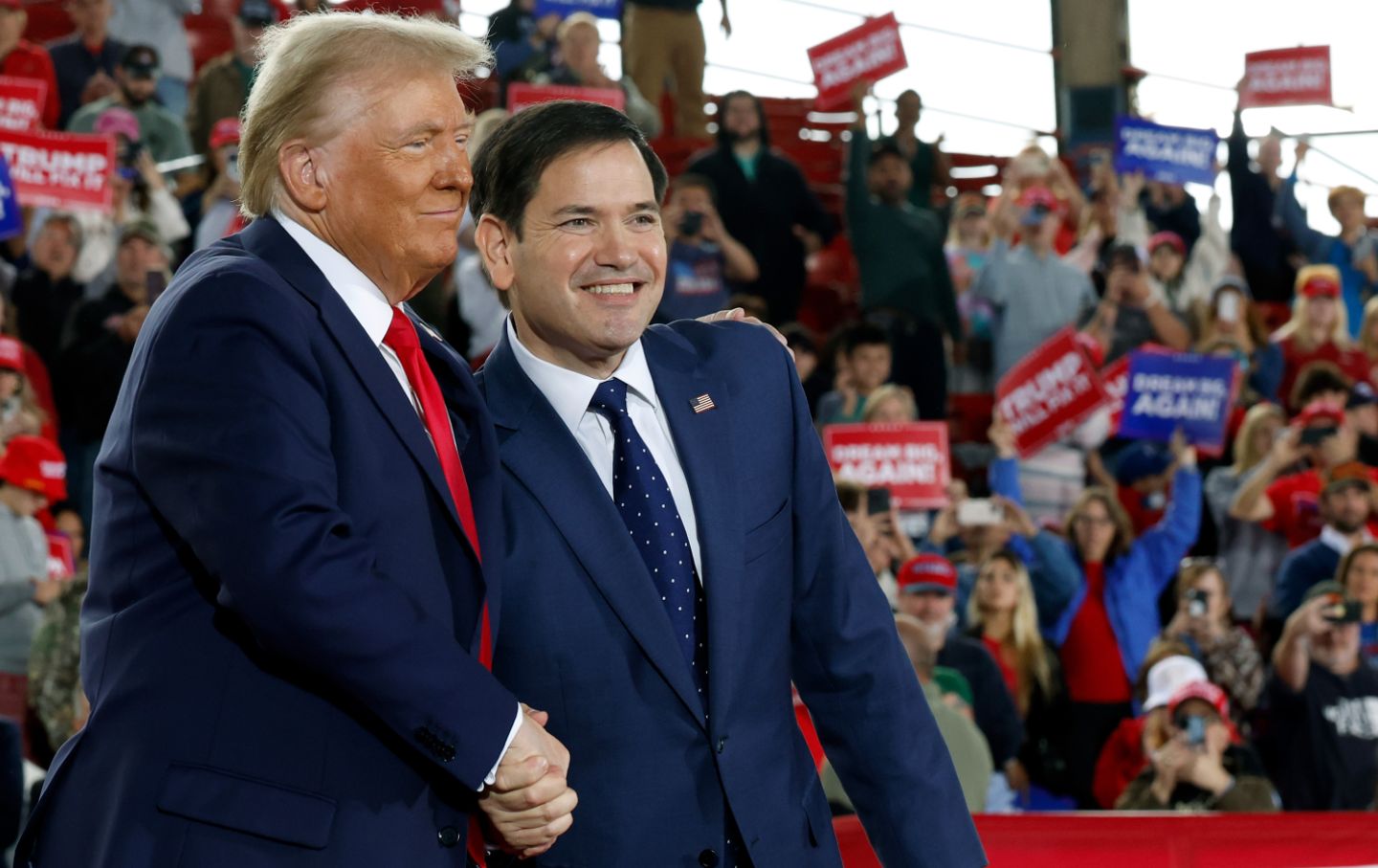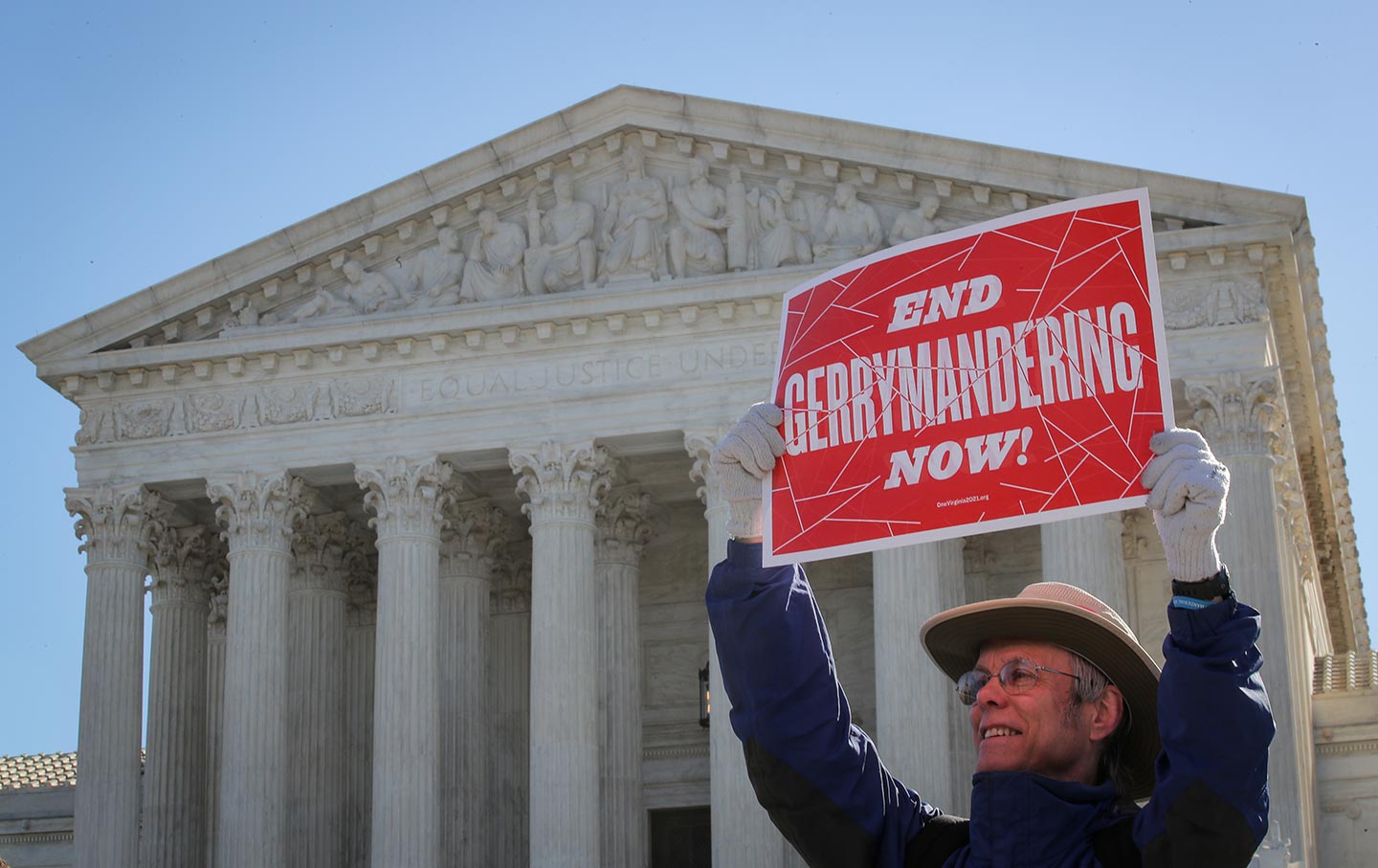Donald Trump’s Foreign Policy Will Be Chaos First, Not America First
His team of cronies includes establishment hawks and cranky outsiders who are more likely to deliver global anarchy than world peace.

Donald Trump won the presidency in both 2016 and 2024 in no small part because he ran as an outsider, with anti-war proclivities that stood in contrast to a bipartisan political establishment discredited by the forever wars. But Trump’s first term in office showed how shallow his anti-war commitments actually were, as he repeatedly gave powerful posts to establishment hawks such as John Bolton, John Kelly, H.R. McMaster, and Nikki Haley while rolling back Barack Obama’s legacy of diplomatic engagement with Iran and Cuba. Trump’s actual foreign policy consisted largely of continuing the forever wars, engaging in nuclear brinkmanship with North Korea, applying maximum pressure on Iran (and scuttling Obama’s nuclear deal), and withdrawing from long-standing arms control deals with Russia.
While Trump didn’t start any new wars, he was quicker than even Obama to engage in long-distance bombing. Far from being an “isolationist” (a nonsensical accusation levied by establishment figures wedded to the outdated framework of World War II and the Cold War), Trump’s actual philosophy was “more rubble, less trouble.” That is to say, Trump was willing to project violence abroad (including, in the case of North Korea, threats of preemptive nuclear war) but wary of putting boots on the ground.
Given his record, Trump shouldn’t have been able to sell himself in 2024 as a peace candidate. The fact that he did so is part based on his amazing chutzpah—but also on the dubious foreign policy record of Joe Biden. A dyed-in-the-wool establishment internationalist, Biden elevated maintaining American global hegemony to a guiding principle, which meant he was unwilling to negotiate an end to the Russia/Ukraine conflict or to restrain Israel in any meaningful way in its savage and nihilistic pummelling of the Palestinian people and neighboring countries. Given spiralling conflicts in both Europe and the Middle East, combined with Biden’s continued confrontationist stance towards China, the war-weary public again looked for an anti-establishment alternative.
Cynical and cagey, Trump answered the call by arguing that his America First foreign policy is the anti-war war alternative. He claimed, “During my Administration, we had peace in the Middle East, and we will have peace again very soon!” In his victory speech, Trump said, “I’m not going to start wars, I’m going to stop wars.”
The left should demand that Trump live up to this promise. But we should also be skeptical that Trump’s second term will be any more anti-war than his first. There’s little reason to think that either Trump or his foreign policy team have the skill or the desire for a true anti-interventionist foreign policy, one that would draw down the American empire, use diplomacy to engage with rivals, and shift resources from the bloated military budget toward domestic repair and international climate action.
One reason to wary of Trump’s foreign policy is that his team of advisers are a mixed bag of establishment hawks and cranky America First outsiders. The foreign policy establishment (including Democratic Party hawks) is reportedly thrilled by the naming of Senator Marco Rubio to be secretary of state and Representative Mike Waltz to be national security adviser. Conversely the establishment has been unhinged by some of Trump’s wild-card nominations—notably those of Fox News host Pete Hegseth to be secretary of defense and former representative Tulsi Gabbard to be director of national intelligence. Hegseth isn’t so much a hawk as a militaristic nihilist, who in 2017 advocated pre-emptively nuking North Korea.
Gabbard is a more heterodox and intriguing figure. Although an ultra-hawk in the Middle East, she is also an advocate of diplomatic engagement with Russia to end the conflict in Ukraine. This has earned her abuse from establishment figures (including Democrats such as Hillary Clinton), who have smeared Gabbard as a Russian asset. Trump’s patron-turned-consigliere Elon Musk has been tasked with gutting the federal bureaucracy, but he also has some unorthodox foreign policy ideas: The New York Times reports that Musk met with Iranian diplomats to ease tensions between the United States and the Islamic Republic (a claim that Iran vehemently denies).
We should welcome any overtures Gabbard and Musk might make in the direction of diplomacy. There are some very intelligent Trump supporters who argue that Trump will in fact override his more hawkish advisers and implement an American First foreign policy that will decisively turn away from Joe Biden’s reckless interventionism and sponsorship of multiple wars. This was an argument very ably made recently in Foreign Affairs by Dan Caldwell, public policy adviser at Defense Priorities and Reid Smith, vice president of Foreign Policy at Stand Together.
Caldwell and Smith argue, “The Republican Party should embrace Trump’s ‘art of the deal’ foreign policy approach. Trump has articulated a desire to negotiate with U.S. adversaries such as China, Iran, North Korea, and Russia to de-escalate tensions and avoid fresh conflicts.”
Alas, these idealistic sentiments deserve the ironic response Jake Barnes delivered in Ernest Hemingway’s The Sun Also Rises: “Isn’t it pretty to think so?” We should be grateful that conservatives such as Caldwell and Smith are embracing foreign policy restraint. This presages well for a future where the left and right can work toward a bipartisan drawdown of the American empire. But that will have to take place in another presidency. Nothing in Trump’s record should make us confident that his spasmodic anti-war tendencies will result in genuine restraint.
Instead, we should be troubled by the incoherence of Trump’s cabinet picks. The governing principle of his nominations is neither hawkishness nor restraint but rather cravenness. Trump is putting together not a team of rivals but a team of cronies, united by obsequiousness to his whims. As Trump’s former national security adviser John Bolton notes, “Their connection is fealty to Trump, not loyalty. Loyalty is a good thing, but fealty, that’s a medieval idea of being subservient. He just wants yes-men and yes-women.”
A foreign policy team blowing in whatever direction Trump’s passing fancies points to will by definition be unstable. Trump may be reluctant to send American soldiers to die in wars, but he is otherwise quite happy to use American power—including the threat of nuclear annihilation—to bully foreign adversaries. Nor does Trump have a good record of negotiating with rivals. Even if the war in Ukraine ends with a negotiated settlement, the hawks in Trump’s administration will likely use the freed-up resources to turn the screws on Cuba, Venezuela, China, and Mexico. This is not a genuine anti-war leader but rather the American empire in a new guise. The most plausible path for the second Trump administration is not America First but Chaos First.
Disobey authoritarians, support The Nation
Over the past year you’ve read Nation writers like Elie Mystal, Kaveh Akbar, John Nichols, Joan Walsh, Bryce Covert, Dave Zirin, Jeet Heer, Michael T. Klare, Katha Pollitt, Amy Littlefield, Gregg Gonsalves, and Sasha Abramsky take on the Trump family’s corruption, set the record straight about Robert F. Kennedy Jr.’s catastrophic Make America Healthy Again movement, survey the fallout and human cost of the DOGE wrecking ball, anticipate the Supreme Court’s dangerous antidemocratic rulings, and amplify successful tactics of resistance on the streets and in Congress.
We publish these stories because when members of our communities are being abducted, household debt is climbing, and AI data centers are causing water and electricity shortages, we have a duty as journalists to do all we can to inform the public.
In 2026, our aim is to do more than ever before—but we need your support to make that happen.
Through December 31, a generous donor will match all donations up to $75,000. That means that your contribution will be doubled, dollar for dollar. If we hit the full match, we’ll be starting 2026 with $150,000 to invest in the stories that impact real people’s lives—the kinds of stories that billionaire-owned, corporate-backed outlets aren’t covering.
With your support, our team will publish major stories that the president and his allies won’t want you to read. We’ll cover the emerging military-tech industrial complex and matters of war, peace, and surveillance, as well as the affordability crisis, hunger, housing, healthcare, the environment, attacks on reproductive rights, and much more. At the same time, we’ll imagine alternatives to Trumpian rule and uplift efforts to create a better world, here and now.
While your gift has twice the impact, I’m asking you to support The Nation with a donation today. You’ll empower the journalists, editors, and fact-checkers best equipped to hold this authoritarian administration to account.
I hope you won’t miss this moment—donate to The Nation today.
Onward,
Katrina vanden Heuvel
Editor and publisher, The Nation
More from The Nation

How Rob Reiner Tipped the Balance Against Donald Trump How Rob Reiner Tipped the Balance Against Donald Trump
Trump’s crude disdain for the slain filmmaker was undoubtedly rooted in the fact that Reiner so ably used his talents to help dethrone him in 2020.

The Economy Is Flatlining—and So Is Trump The Economy Is Flatlining—and So Is Trump
The president’s usual tricks are no match for a weakening jobs market and persistent inflation.

Trump’s Vile Rob Reiner Comments Show How Much He Has Debased His Office Trump’s Vile Rob Reiner Comments Show How Much He Has Debased His Office
Every day, Trump is saying and doing things that would get most elementary school children suspended.

How the Groypers Hope to Remake Trump's GOP How the Groypers Hope to Remake Trump's GOP
The perilous politics behind the elevation of Nick Fuentes.




